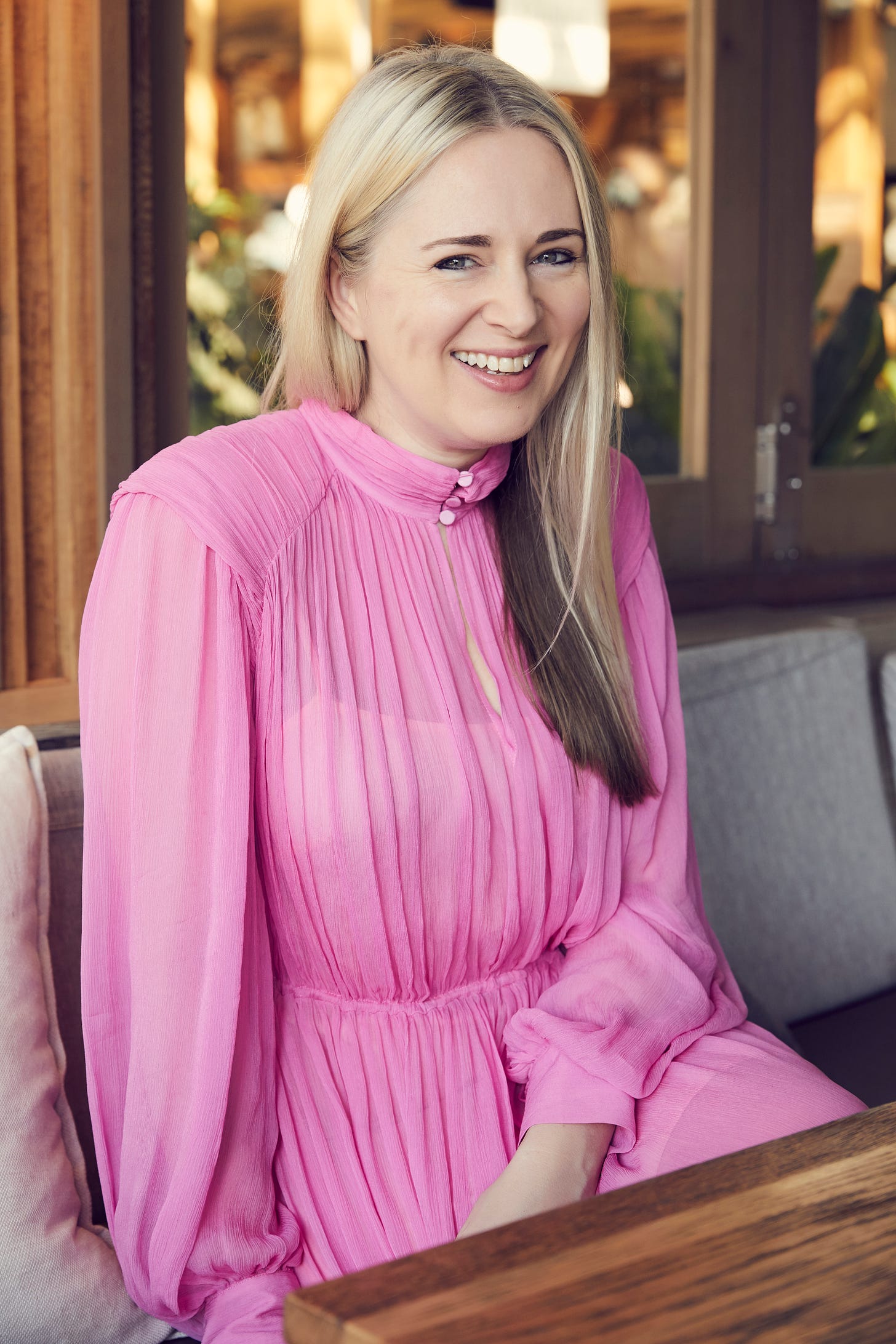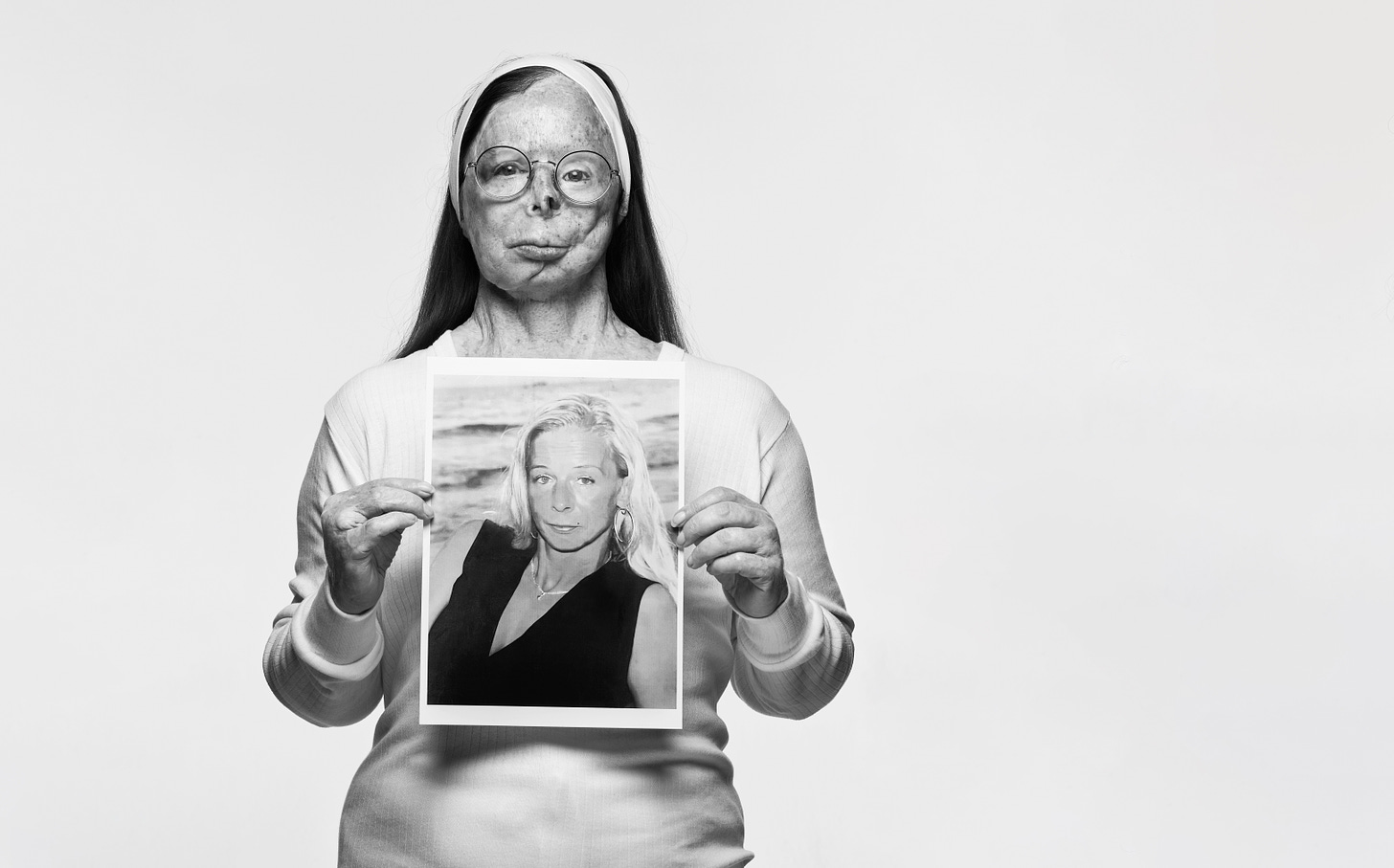Clare Press’s brilliant new book is just the positive reimagining of the fashion sector we need for 2024!
Image shows Clare Press in a pink dress, sitting at a table.
Some of you may know Clare Press as the bestselling author of the Wardrobe Crisis, or the presenter of the much-loved podcast of the same name. Others remember her as the first ever VOGUE Sustainability Editor for Vogue Australia back in 2018. To us, Clare is best-known as our vibrant and seriously knowledgeable Global Sustainability Expert.
This January, her latest book has finally hit UK book stores and what a book it is! To add to her already wonderfully engaging authored books (Wardrobe Crisis & Rise and Resist, How to Change the World) – this time, Clare reimagines the future of fashion. And it’s just the positive reimagining of the future of the fashion sector that we need!
What will you be wearing tomorrow? Will your jacket have been grown in a lab, or your jeans coloured using bacteria? Will we still have shops? What does the future of work look like for the people who make our garments?
Wear Next, Fashioning the Future presents a crystal ball look into tomorrow’s wardrobe, imagining 16 scenarios likely to shape our fashion futures, from conscious, fair, slow and upcycled to biointelligent and digital.
We all know that the current fashion system is wasteful, environmentally harmful and exploitative. If we carry on as we do now, it could account for a quarter of global emissions by 2050. Now it’s time for solutions. They already exist! Creative thinkers are dreaming up new ways to craft our sartorial identities that don’t wreck the planet.
Clare introduces us to fascinating innovators around the globe who are redesigning fashion from the ground up, and changing it in the most fundamental ways.
Can’t wait to read the book? – buy the book below.
Want to work with us?
Photo shows a red and pink background with the words ‘ Now Hiring’.
This is an exciting opportunity to join Fashion Roundtable and Bath Spa University in a consultancy capacity for 3 x days a week. You will be responsible for assessing, mapping, and monitoring funding bids and leading on opportunities for funding policy work. As well as supporting Fashion Roundtable’s team in conducting high-quality research and reporting as tasked for a range of outputs.
How can trade in natural resources benefit the environment, land managers and farmers?

The Environmental Audit Committee (EAC) has started evidence sessions with senior stakeholders in the green economy. The evidence sessions entitled, ‘The role of natural capital in the green economy’ will focus on how best the trade of natural capital – natural resources such as soil, water, air and the living environment – can be advanced in a way that not only benefits the environment, but also landowners and farmers.
Our work in this area
Fashion Roundtable is committed to looking at food and fibre sovereignty, as well as growing green jobs as part of our ongoing work within our Creative Wellbeing Economy framework. In our living document, we delve into the notable parallels between food and fibre, as well as regenerative farming. This plays into our steer on the lack of a concerted effort to focus on the green jobs of tomorrow.
This turns the current focus of economic growth at-all-costs on its head and focuses instead at utilising fewer materials and extending the life of products. Under the CWE framework this means:
Meaningful, well paid and respected long-term jobs;
A focus on soil health, supporting energy, food and fibre sovereignty, and regenerative practices;
Durability and repairability in manufacturing and design practices;
Placemaking which looks to use existing spaces with a hyperlocal perspective.
New research by the Modern Slavery PEC on the Uyghur forced labour in the green energy sector

New research has been released by the Modern Slavery Policy Evidence Centre, Anti-Slavery International, Sheffield Hallam University and Investor Alliance for Human Rights. The research entitled – “Respecting Rights in Renewable Energy: Addressing forced labour of Uyghurs and other Muslim and Turkic-majority peoples in the production of green technology” – examines approaches to addressing state-imposed forced labour of Uyghurs and other Turkic and Muslim-majority people in the Xinjiang Uyghur Autonomous Region (Uyghur Region).
The research focuses on solar and electric vehicle battery supply chains and aims to help investment professionals better understand and address the risk of exposure to forced labour in their green technology holdings.
In the press: our content editor Meg Pirie on forced labour in supply chains

Loadstar interviewed our Content Editor, Meg Pirie on a new report by the Business and Human Rights Resource Centre, whose research claimed that 46% of brands benefited from using forced labour in supply chains, raising concerns of the use of Uyghur forced labour.
Meg said the report was one of many that “should raise concerns” over the sourcing of apparel and the connection to “exploitative supply chains” that lacked transparency.
“We’d like the UK to follow the European Council direction towards corporate sustainability due diligence directive, which aims to enhance protection of the environment and human rights, as well as the new regulations on extended producer responsibility.”
Meg said, as the secretariat for the Ethics and Sustainability in Fashion APPG, Fashion Roundtable had held an evidence session on the subject of the Uyghur crisis.
“The role of the industry in perpetuating and tacitly supporting human and labour rights abuses globally, with a specific focus on the cotton industry, was made clear.
“The APPG heard clearly how involved the fashion and textiles industries are in the use of forced labour in Xinjiang.”
Acid attack survivor and activist Patricia Lefranc heads up new awareness campaign
Picture of Patricia Lefranc. Credit: Rankin. Image shows acid attack survivor and activist Patricia Lefranc
This week, the Acid Survivors Trust International launched their latest campaign which aims to prevent acid attacks. Working with renowned British fashion photographer Rankin, they have released the Tear Couture Look Book, featuring acid attack survivor and activist Patricia Lefranc as Rankin’s model.
Patricia Lefranc said:
“Many people are unaware of the enormous pain and suffering that acid attack survivors go through. I’m so grateful to Rankin for this opportunity to raise awareness of our situation, and to take steps together to prevent further attacks.”
Research shows a link between industry and the number of acid attacks worldwide, one in which the fashion industry is also connected to.
Phil Patterson, Chair of the ZDHC MRSL Council and Wastewater Council, said:
“Corrosive substances are routinely used in the dyeing, printing and finishing in fashion industry. There is a significant opportunity to improve how they are transported, stored, dispensed and handled within factories to both reduce the risk of injury to workers and to reduce access to those substances that could be used in premeditated acid attacks.”
Rankin commented:
“I have a special affinity with the fashion industry and I’ve been delighted to see the changes that have taken place within the industry in recent years to make it more sustainable and responsible. When ASTi explained to me the issue of acid misuse within supply chains, I knew I had to take action.”








